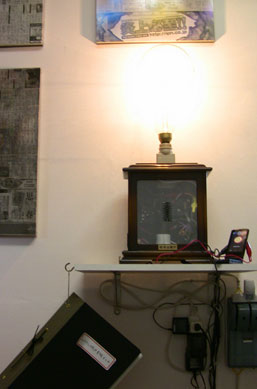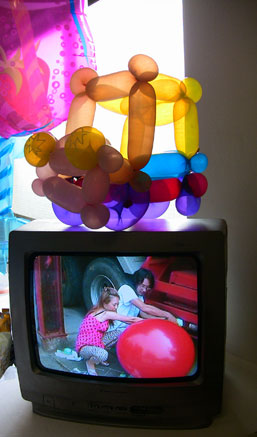Harnessing Tokyo’s Libido for Artistic Ends
“Chim Pom want to make art from the participation of anonymous people,” Mujinto Production’s owner Rika Fujiki tells me. The disused building that houses the gallery on its third floor is similarly anonymous, nestling in a residential fringe of Koenji just within stumbling distance of al fresco yakitori shacks and fraying izakayas. The gallery itself is hardly bigger than a 6-seater ramen bar. Just to one side there is a large format photograph of the six members of Chim Pom dressed as Pluto, Donald Duck, Minnie Mouse and Winnie the Pooh (who isn’t a Disney character) frolicking in the “Venice Biennale” kitsch canalsides of Tokyo’s Disney Sea.

That sort of juvenile camp is their preferred medium, but it isn’t their message. Chim Pom like to perform Situationist pranks, operating tactically within existing networks of communication and media while gleefully rewriting their tired scripts. They rescue the bland white noise of modern society from oblivion. The best work here, called Erokiteru (Libido-converting Electrical Generator), involves a cell phone, the number of which has been previously advertised in the erotic personals section of an evening tabloid. Each time a prospective customer dials the number, the light bulb in the attached “generator” lights up. As Chim Pom explain in the attached patent documentation, libido can be channeled to (literally) productive ends in an age of terminally dwindling energy sources. They hope it might even be diverted from deviant ends, thereby preventing rape and other sexual misdemeanors. In the space of the half hour I spent chatting to Fujiki, the generator flared up no less than eight times. I wonder when peak ‘generative’ times in Tokyo are?
If Erokiteru taps a vein of squandered sexual frustration and turns it to “productive” use, Ore Ore shows the reverse: surplus money expended in a gratuitous act of random charity. In a guerilla reversal of ore ore sagi, a surprisingly successful form of fraud in which Japan’s older generation are targeted by phone callers who pretend to be a relative in a sudden financial crisis and beg for an immediate emergency bank transfer, the artists impersonate an old woman’s son, make some sheepish small talk, and try to get her bank details in order to transfer a small “donation” to her.

The Robin Hood antics finally succeed in tricking her into accepting an unsolicited gift. Like autistic gnomes that spend their days tampering with ruined circuitry, fiddling with all the unpromising materials of modern society and especially kitsch pop culture, their intentions are earnest and well-meant but ultimately impotent: these are playful if somewhat useless acts of ingenuity. They’ve even got something of the ten-year-old boy’s scatological hangups. For Akataro, the six members of Chim Pom pool the collective dirt and grime scrubbed off their bodies and palm it off as a limited edition action figure sealed in a clear plastic cube. This work is by far more original and “limited” than any number of other vinyl toy collectibles, and worth many more snickers.
Another elaborately orchestrated prank called Tengoku no Geijutsuka (meaning ‘Artist from Heaven’) an installation involving a menagerie of balloon animals, all inflated using the diesel exhaust from heavy vehicles that are banned from entering central Tokyo due to pollution regulations. Some of the balloons are hanging from the ceiling of Mujinto; others were released and left to float up towards the spires of Shinjuku’s Tokyo Metropolitan Office towers. Watching the video footage of their skyward release, there’s something faintly sinister about the revisitation of these noxious fumes upon the fortress; somewhere in there, the earnest officials who drafted the traffic laws are oblivious to the flock of colorful balloons silently bobbing outside their window, born aloft by the noxious fumes they tried so hard to banish. Pollution turned into playthings. Like a magician performing a parlor trick, making his revolver bloom into a bunch of pansies, Chim Pom practise a form of virtuous recycling, neutralizing the more toxic excesses of our trashy society and scattering the harmless byproducts for our amusement.
Darryl Jingwen Wee
Darryl Jingwen Wee


